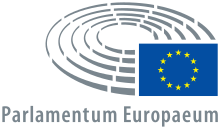London South East (European Parliament constituency)
This article uses bare URLs, which may be threatened by link rot. (May 2021) |
| London South East | |
|---|---|
| European Parliament constituency | |
 European Parliament logo | |
| Member state | United Kingdom |
| Created | 1979 |
| Dissolved | 1999 |
| MEPs | 1 |
| Sources | |
| [1] | |
Prior to its uniform adoption of proportional representation in 1999, the United Kingdom used first-past-the-post for the European elections in England, Scotland and Wales. The European Parliament constituencies used under that system were smaller than the later regional constituencies and only had one Member of the European Parliament each.
The constituency of London South East was one of them.
When it was created in England in 1979, it consisted of the Westminster Parliament constituencies of Beckenham, Bexleyheath, Chislehurst, Erith and Crayford, Orpington, Ravensbourne, Sidcup, Woolwich East and Woolwich West.[1]
United Kingdom Parliamentary constituencies were redrawn in 1983 and the European constituencies were altered to reflect this. The new seat comprised the following Westminster constituencies: Beckenham, Bexleyheath, Chislehurst, Eltham, Erith and Crayford, Greenwich, Old Bexley and Sidcup, Orpington, Ravensbourne and Woolwich.[2] These boundaries were used in 1984 and 1989.[3] Greenwich was removed for the 1994 European Parliament election.[4]
Members of the European Parliament[]
| Elected | Members[5] | Party | |
|---|---|---|---|
| 1979 | Brandon Rhys-Williams | Conservative | |
| 1984 | Peter Price | Conservative | |
| 1989 | |||
| 1994 | Shaun Spiers | Labour | |
Elections[]
| Party | Candidate | Votes | % | ±% | ||
|---|---|---|---|---|---|---|
| Labour | Shaun Spiers | 71,505 | 41.0 | |||
| Conservative | Peter Price | 63,483 | 36.4 | |||
| Liberal Democrats | Jonathan Fryer | 25,271 | 14.5 | |||
| Green | Ian Mouland | 6,399 | 3.7 | |||
| Liberal | Robin Almond | 3,881 | 2.2 | |||
| National Front | Kevin Lowne | 2,926 | 1.7 | |||
| Natural Law | John Small | 1,025 | 0.6 | |||
| Majority | 8,022 | 4.6 | N/A | |||
| Turnout | 174,990 | 35.4 | ||||
| Labour gain from Conservative | ||||||
References[]
- ^ "David Boothroyd's United Kingdom Election Results". Retrieved 20 January 2008.
- ^ "European Elections 84. Candidates named for European Parliament elections on June 14". The Times. 16 May 1984. p. 5.
- ^ "378 candidates fight the 81 UK European seats; European Elections 1989". The Times. 19 May 1989.
- ^ a b Whitaker's Concise Almanack 1995. London: J Whitaker & Sons Ltd. 1994. p. 277. ISBN 0850212472.
- ^ http://www.election.demon.co.uk/eplon.html
External links[]
- European Parliament constituencies in London (1979–1999)
- 20th century in London
- 1979 establishments in England
- 1999 disestablishments in England
- Constituencies established in 1979
- Constituencies disestablished in 1999
- British election stubs
- European Union stubs